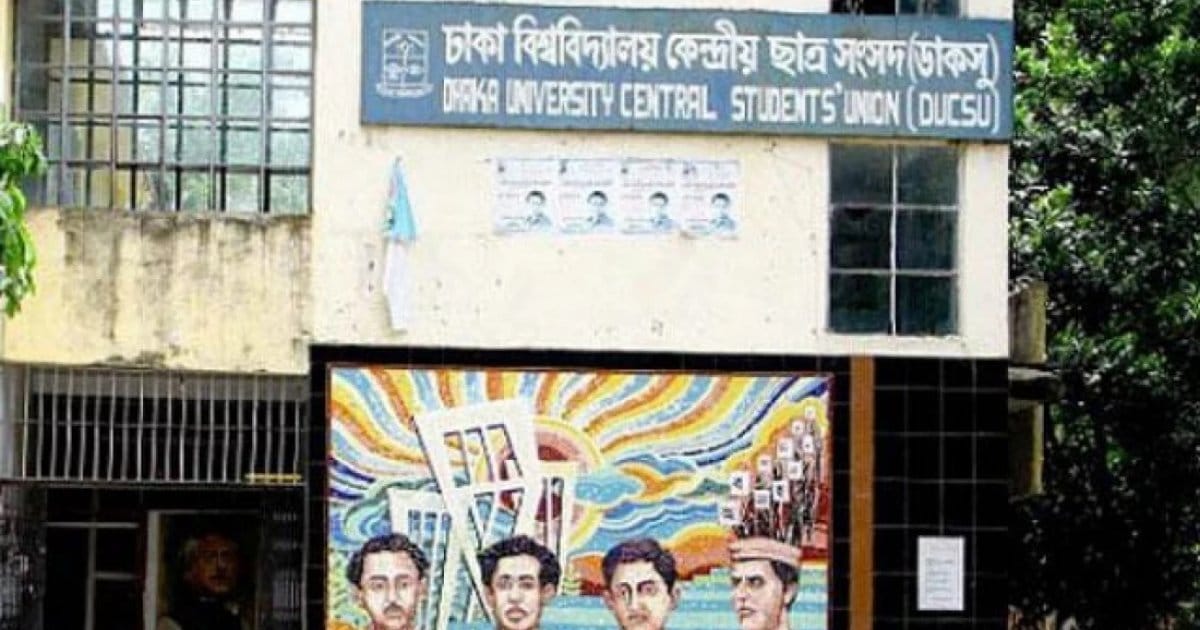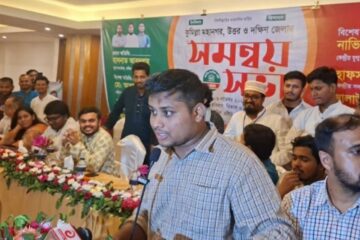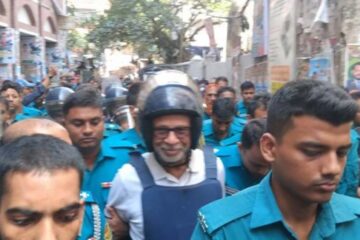The Dhaka University Central Students’ Union (Ducsu) committee, elected recently with a landslide victory by the Islami Chhatra Shibir-backed Oikyaboddho Shikkharthi Jote, is planning various welfare and infrastructural projects while facing significant funding constraints and a budget deficit from the university.
Operating on “zero balance” and receiving no managerial or operational funds since taking office, the committee has adopted an external sponsorship model to implement its 36 pledges.
Despite initial groundwork—including launching trial projects, repairing the Ducsu building, holding medical camps, and initiating bedbug eradication—the committee was unable to fulfill any pledges during its first month, which was spent primarily on planning and establishing an operational structure.
Ducsu VP Abu Shadik Kayem noted that the committee had to start from scratch because Ducsu had been inactive for so long, and the initial month was spent primarily on planning.
The first phase involved establishing an operational structure and holding an initial consultation meeting with the Hall Councils to understand and prioritize problems.
Regarding the budget deficit they face in implementing their plans, he mentioned that they are “collecting resources” from the alumni who earlier wanted to “sponsor” but were kept “unutilized”. “Dhaka University alumni are everywhere; we are trying to engage them.”
Funding challenges and external sponsorship
The committee faces a severe financial crisis, receiving no managerial cost or operational funds from the university since its tenure began, leaving the Ducsu account at a “zero balance”.
General Secretary SM Farhad confirmed they are covering all expenditures—including travel, transportation, and official hosting—out of their own pockets.
According to Shadik Kayem Ducsu has formally requested funds and accountability from the Treasurer’s office twice, demanding an audit of student fees collected since 1990, the 2019 audit report, and the annual Tk60 fee collected between 2019 and 2024.
Although one official mentioned an allocation of Tk30 lakh, Ducsu clarified this was intended for building repairs, not operational costs.
Due to a lack of institutional support, Ducsu has adopted external sponsorship for major initiatives. “Various organizations will sponsor them, and whoever sponsors something will have their name on it. They’ll implement it directly, and we won’t touch the money,” SM Farhad explained.
This applies to high-cost projects like bedbug eradication (Tk30 lakh) and AC installation in female halls (over Tk1 crore), with sponsors directly paying service providers.
However, the GS emphasized that the university must still provide minimum funds for internal programs such as cultural activities, literary discussions, and basic managerial costs.
What Ducsu has done and ongoing work
According to top leaders, in its initial period, Ducsu focused on laying a structural foundation and launching trial projects.
The university initiated repair work on the deteriorating Ducsu building, fixing washrooms and separating them for male and female use.
VP Shadik Kayem mentioned the primary focus has been on establishing structure and coordinating among administration, staff, teachers, social organizations, and hall representatives.
The committee is pursuing accountability by requesting the removal of individuals involved in partisan politics from the Ducsu offices and addressing indiscipline among Estate Office security staff.
“A commuter bus tracking app for students is undergoing trials with full implementation expected within a week. Steps have been taken to increase shuttle service capacity. Ducsu held a medical camp near Shamsunnahar and Jagannath Halls through Ibne Sina Medical Trust, securing 50% hospital discounts for students. “
GS SM Farhad mentioned, dedbug eradication beginning at Zia Hall, with plans to extend to all 18 halls.
Work has started on a guardian lounge and daycare center, with students receiving support for personal, familial, and medical issues as well, according to the officials.
For the food crisis, Ducsu is running trials at different halls with a committee inspecting canteen quality and coordinating with safe food initiatives.
Action has been taken against poor-quality providers, as seen in Mohsin Hall.
Ducsu also plans to host regular cultural programs and develop a draft Cultural Calendar.
They are also establishing a “Global Solidarity Hub” for Palestine and other oppressed populations, according to Shadik.
Shadik also mentioned that cleaning camps, like a recent cleaning camp on Saturday by the Dhaka South City Corporation, would be held every month.
Future plans and upcoming initiatives
Ducsu plans to implement several large-scale projects centered on welfare, security, and infrastructure.
To address the accommodation shortage, Ducsu plans to “pressurize” the administration to start construction of four new dormitories approved under the Tk2,841 crore mega plan this year.
For non-residential students, Ducsu aims to arrange an “accommodation allowance” within six months.
Plans are underway to completely modernize the university medical center with new instruments expected this month and full services by next month.
Ducsu is seeking MoUs with private hospitals offering 50% discounts and planning to bring expert doctors from affiliated hospitals for routine duty at the medical center.
A critical initiative involves improving security for female students through “security boxes” at female halls, allowing entry via student card, facial recognition, or fingerprint scans, and granting more flexible access. Devices are expected to be installed within October.
Ducsu is also working to coordinate the Proctorial body and Estate Office to enhance campus security, with plans to restrict campus access daily between 6:30pm and 6:30am.
Ducsu plans to establish Computer Labs in every hall, with rooms being requested and donated computers already procured.
They are collaborating with the Information and Communication Technology Division for training courses and pursuing free access to paid resources like journals and software through university sponsorship.
Other plans include ensuring continuous campus cleaning, implementing a comprehensive First Aid Training Program in every hall, starting AC installation in the female hall reading rooms, and advocating for maternity leave for female students, for which an application has been submitted.



